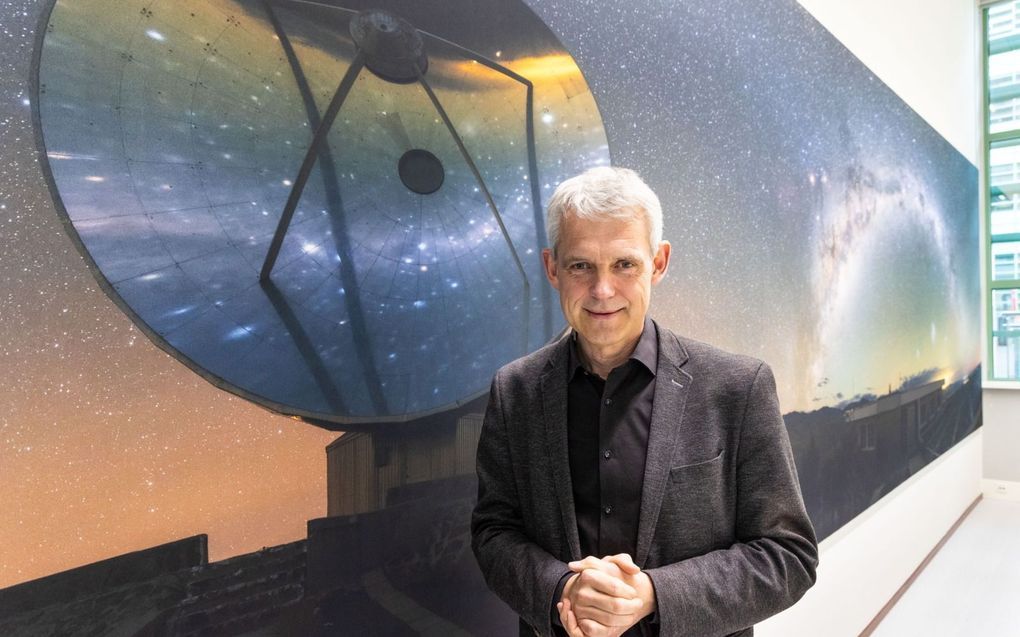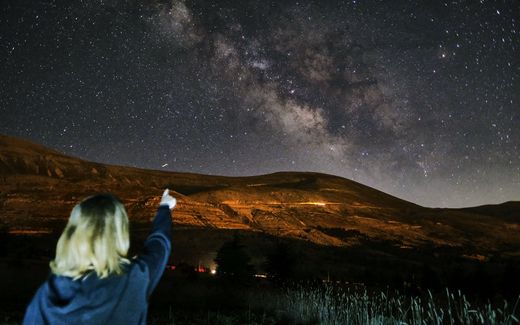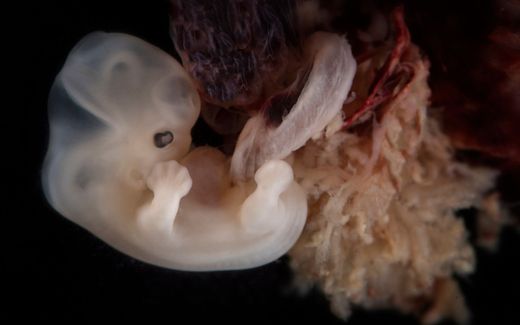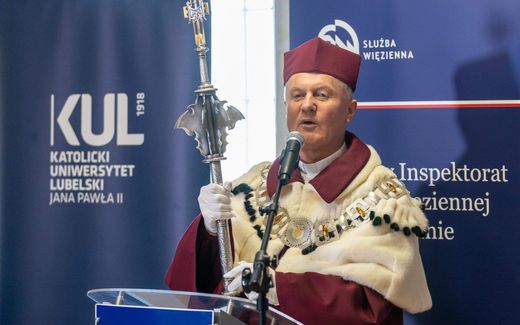Astronomer Heino Falcke: "Dancing trees tell about God"
14-03-2023
Christian Life
Louis Seesing, RD

Astronomer Heino Falcke poses in front of a poster showing a space telescope at Radboud University's Faculty of Astronomy in Nijmegen. Photo RD, Anton Dommerholt
Christian Life
Astronomer Heino Falcke often gazes at the universe. The cosmos can still thrill him, but terrestrial nature no less. "What I experienced recently in the forest filled me with joy and praise for the Creator," he says.
The 56-year-old professor of German nationality won several awards, including for photographing a black hole. He is the first scientist who, together with an international team, managed to capture such an area –where gravity is so strong that nothing can escape it. Falcke sometimes presides as a lay preacher at the Evangelical Unierte (Lutheran and Reformed, LS) Kirche in Frechen, Germany.
Looking at the universe, he is overcome by the feeling that there is a much greater reality "beneath, alongside and above creation" than science can know. This conviction fills the astronomer with awe and humility, but above all, it makes him feel grateful. "I find it beautiful that I get to be a part of creation and see all this," he says.
Looking at the starry sky also gives Falcke a sense of connection. "When God instructed Isaiah to look at the stars-to ascertain Who made them (Isa 40: 26, LS), the prophet saw exactly the same starry sky we see today. When we look up, He still wants to tell us something. When you know Who is the Creator of all that and that He looks after us humans, you start to see nature more and more as a love letter from God."
Omniscience
The universe also shows traces that tell something about its Maker, Falcke says. For instance, he sees God's reliability in it because of the natural laws that always follow the same course. However, the universe also testifies to God's freedom and creativity: "Despite these natural laws, things also happen there that are difficult to predict. Think of meteorite impacts, for example."

Can black holes also teach us something about God? Falcke believes so. "We don't know what goes on in them, and we will probably never find out. This shows that there are fundamental limits to our knowledge. Omniscience, a property that God does have, is not possible in science."
Life in the universe
At the same time, astronomers are increasingly trying to push the boundaries of what is knowable. Falcke, therefore, does not rule out finding life in the universe in the coming years. He is thinking, for example, of single-celled organisms on Mars or water under the surface of a planet's moon. "That could very well be the case; here on Earth, we are also increasingly encountering life despite extreme conditions."
If intelligent life exists elsewhere in the universe, it would certainly not turn Falcke's faith upside down. If so, God in His wisdom apparently wanted it to be that way, he states matter-of-factly. "Medieval theologians already held the principle that God should not be limited in His omnipotence by determining what He should and should not be allowed to create. So intelligent life on another planet would not embarrass me."
Meditate
Not only the cosmos makes Falcke think about God, earthly nature also often has this effect on him. He recently went into nature with some members of his church in Frechen. "We first read a Bible text, after which everyone went out individually to meditate on the text in the woods."
It was the middle of winter, Falcke reflects. The bare trees looked dead. The setting sun gave the sky a fiery red glow. "That reminded me of the call of Moses. God spoke from a fire that flared up from a bramble, yet that bush did not burn."
Similarly, the trees in the forest did not seem to care when a strong wind swept through them. Instead, they danced in Falcke's experience. "So there was still life in them; otherwise, the branches would break off. So something of God's reality shone through in that dead forest. What seems dead now will blossom again in spring, an image of new, spiritual life. That filled me with joy and praise for the Creator."
This article was translated by CNE.news and published by the Dutch daily Reformatorisch Dagblad on March 11, 2023
Related Articles






